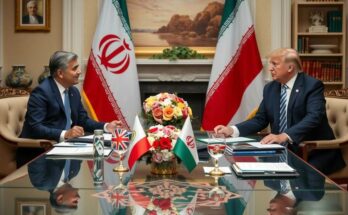Iran, Iraq, and Syria convene for urgent talks in Baghdad amid Syrian rebels’ advances. The meeting, involving top foreign officials, comes as HTS captures Hama, raising security concerns for Iraq and influencing regional stability. Iraqi leadership calls for non-interference, reflecting mixed domestic sentiment on the conflict in Syria, with acknowledgment of the pressing geopolitical implications.
On Friday, Iranian Foreign Minister Abbas Araghchi arrived in Baghdad for a significant tri-national meeting with Iraqi Foreign Minister Fuad Hussein and Syrian Foreign Minister Bassam Al-Sabbagh. This urgent discussion was prompted by the rapid territorial gains made by Syrian rebel forces, particularly the Islamist group Hayat Tahrir al-Sham (HTS), who recently took control of the strategically important city of Hama amidst a series of defeats inflicted on regime forces. A joint statement between Baghdad and Tehran is anticipated following this closed-door meeting, reflecting a united stance in response to the evolving situation in Syria.
The situation on the ground has elicited considerable concern from Iraqi officials, including Foreign Minister Fuad Hussein, who stated that “Iraq is following events in Syria with great concern due to the direct impact they will have on the security and stability of the region.” It is acknowledged that the rapid advances of opposition factions took the Assad regime and its allies by surprise, raising questions regarding the effectiveness of any potential interventions. An anonymous source from the Iraqi Foreign Ministry expressed views that it may be too late to significantly influence the ongoing developments favorably for the Syrian regime.
In parallel, domestic sentiments within Iraq are mirroring this caution. Prominent political figures, including Khamis Al-Khanjar, have vocally urged against intervention in Syria and the deployment of Iraqi fighters in support of the Syrian regime. Al-Khanjar’s statement emphasized the need to evaluate the ramifications of such actions. Iraqi Shia cleric Muqtada Al-Sadr echoed this sentiment by insisting that Iraq must not engage in the Syrian conflict, reiterating that the Syrian populace should determine their fate.
Conversely, Falih al-Fayyadh of the Popular Mobilisation Forces asserted that Iraq could not overlook the situation when perceived terrorist threats loom in Syria, characterizing the ongoing crisis as influenced by “foreign agendas and Western interventions.” He argued for preventive measures in order to defend Iraq’s national security, given the inseparable nature of security issues between Iraq and Syria.
This ongoing emergency meeting signifies the intensifying diplomatic interactions among Iraq, Iran, and Syria in light of the precarious regional dynamics shaped by the escalating conflict in Syria. A comprehensive response is anticipated, one that acknowledges both the internal pressures and regional security concerns.
The complex geopolitical landscape surrounding Syria has drawn significant attention from neighboring nations, particularly Iraq and Iran. With the Syrian conflict ongoing since 2011, recent advancements by rebel forces, specifically the HTS, have generated critical security concerns for these countries. The rebellion’s significant territorial gains, including control over key cities like Hama, have been perceived as a serious threat not only to the Assad regime but also to the stability of the entire region. The outcomes of diplomatic efforts between Iraq, Iran, and Syria could bear profound implications for their respective security strategies and regional alliances, necessitating a unified front in addressing this evolving scenario.
The emergency meeting between Iraq, Iran, and Syria represents a crucial yet complex response to the ongoing instability in Syria, particularly due to recent territorial gains made by rebel factions. While Iraqi leaders express a desire for non-intervention and emphasize the importance of respecting Syrian sovereignty, there are persistent security concerns regarding the implications for regional stability. The forthcoming joint statement from the three nations may indicate a strategic approach to coherently address the mounting crisis, emphasizing the need to balance national interests with regional stability.
Original Source: www.newarab.com




